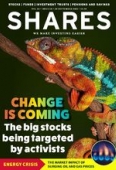Archived article
Please note that tax, investment, pension and ISA rules can change and the information and any views contained in this article may now be inaccurate.
UK investors start to lose faith in ‘transitory’ inflation narrative

It wasn’t a surprise to investors that the Bank of England kept interest rates unchanged at 0.1% after its latest policy meeting (23 Sep), and voted to maintain bond purchases.
However, sterling gained against the US dollar and bond prices fell slightly (meaning yields went up) after the MPC (monetary policy committee) noted that some cost pressures ‘may prove more resilient’.
This is a surprising change in stance and at odds with other major central banks which have maintained that the inflationary spike seen across the world is likely to be transitory caused by one-off factors driven by supply chain issues related to the sharp recovery in the global economy.
For example, US bond investors have taken the Federal Reserve’s transitory assumption at face value as shown by US treasuries pricing in moderate medium-term inflation.
By contrast UK bond investors have pushed up 10-year break-even inflation rates which are now implying that inflation could well exceed the central bank’s 2% target by up to 1% annually over the next decade, according to investment manager Janus Henderson.
The MPC said its own estimate of underlying pay growth had picked-up since August and was now above pre-pandemic levels while surveys suggested that UK household medium-term inflation expectations had also increased.
The current material rise in forward wholesale gas prices and knock-on effects to consumer energy bills has further tipped the balance towards inflation expectations becoming embedded.
Labour market tightness, and a shortage of HGV drivers and seasonal hospitality staff has arguably been exacerbated by the UK departure from Europe with thousands of EU workers returning home.
What this means is that the central bank has become more hawkish with the MPC saying that the case for a modest tightening of monetary policy had only been strengthened by recent data.
Markets are now pricing in an interest rate rise in March next year with two further rate rises before the end of 2022, according to Janus Henderson.
The UK wouldn’t be the first major economy to raise interest rates in the post pandemic era, with that accolade belonging to South Korea which increased interest rates by 0.25% to 0.75% in August.
Across Europe Hungary, Czech Republic and Norway have already raised rates while many emerging economies have hiked rates more than once in the last few months.
It’s questionable how far interest rates can be allowed to rise given the huge amounts of debt taken on by governments and companies since the start of the pandemic.
One sector of the market that is a clear beneficiary of rising interest rates is the banks, which theoretically make a higher net interest margin when interest rates rise.
Important information:
These articles are provided by Shares magazine which is published by AJ Bell Media, a part of AJ Bell. Shares is not written by AJ Bell.
Shares is provided for your general information and use and is not a personal recommendation to invest. It is not intended to be relied upon by you in making or not making any investment decisions. The investments referred to in these articles will not be suitable for all investors. If in doubt please seek appropriate independent financial advice.
Investors acting on the information in these articles do so at their own risk and AJ Bell Media and its staff do not accept liability for losses suffered by investors as a result of their investment decisions.
Issue contents
Danni Hewson
Editor's View
Education
Feature
Great Ideas
Investment Trusts
Money Matters
News
- Ford to invest another $7 billion in electric vehicle push
- Energy crisis goes global... but investors in Shell are quids in
- HeiQ shares take a beating after near 70% drop in profit
- New fund to help modernise old fashioned UK companies
- UK investors start to lose faith in ‘transitory’ inflation narrative
 magazine
magazine








